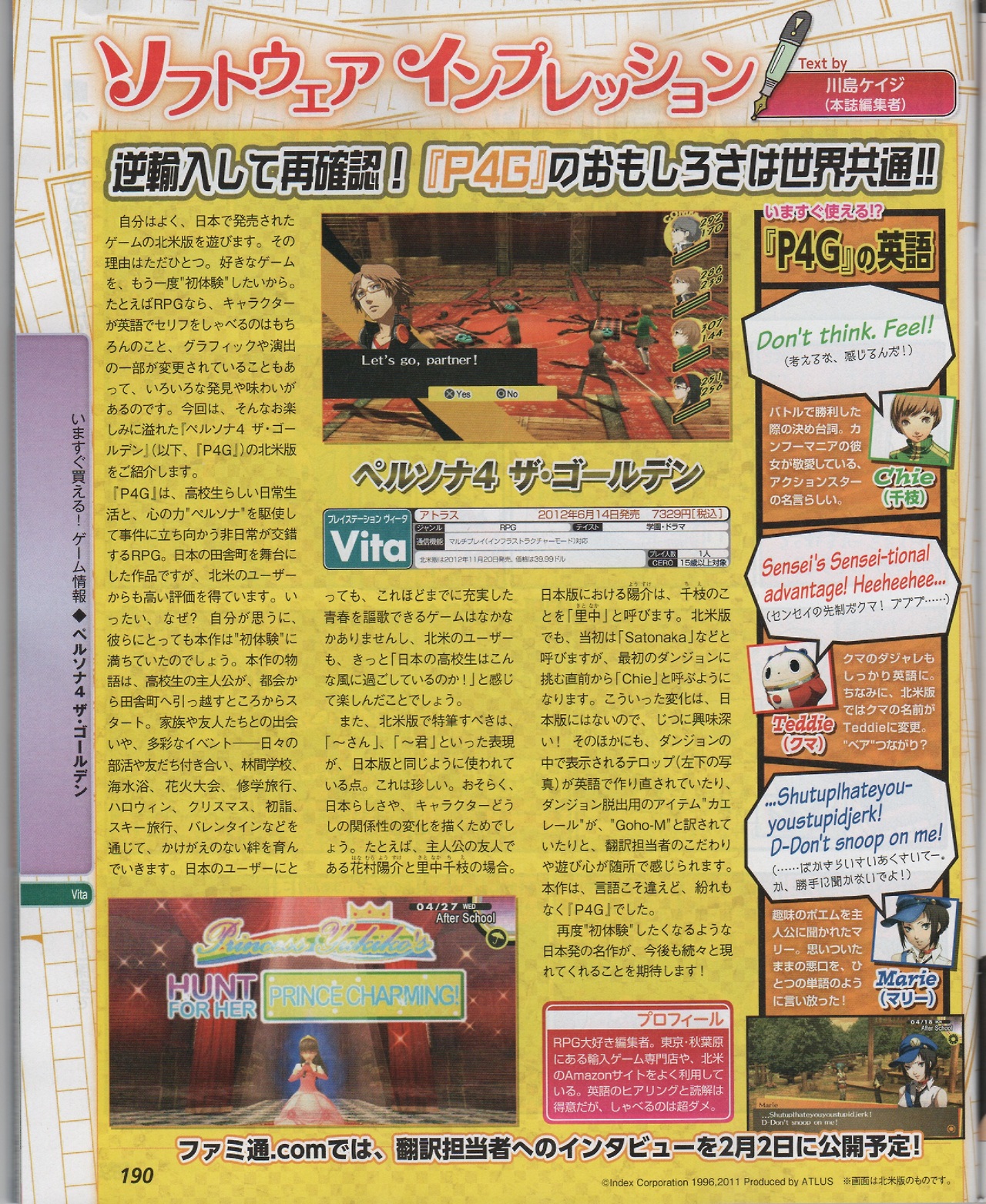Famitsu Impressions: English Persona 4 Golden
By mewarmo990 30 Comments

DISCLAIMER: I worked on this game. This is merely a translation of Famitsu and does not reflect the opinions of Index/Atlus or its staff. I will not be answering questions about Atlus.
So this is an unusual piece of press - Famitsu ran an article on our localization of Persona 4 Golden. Damned proud of everyone who worked on this.
Translation follows:
Software Impressions by Kawashima Kenji, Famitsu editor
I often play the North American localizations of Japanese games, for one reason - to experience the games I love again for the first time. In the case of RPGs, I obviously want to see the characters’ new English lines, but it’s also interesting to discover the little changes in the graphics or cutscenes. This time, I’ll be taking a look at the much-anticipated Persona 4 Golden (henceforth, P4G) for North America.
P4G is an RPG in which the player experiences a high school-like lifestyle while solving mysteries with “Persona”, the power of the heart. Despite being set the rural Japanese countryside, it has been well received by North American gamers. Why is that, you might ask? To me, it could be something like a new experience for this auidence. The story follows a high school student protagonist who has just moved to the countryside from the city. Along the way the player meets new friends and family, lives life with them day by day, experiencing school, the beach, a fireworks festival, a field trip, Halloween, Christmas, Japanese New Year, a ski trip, Valentine’s Day, and more - all once-in-a-lifetime high school experiences that money cannot buy. While even a Japanese player would be hard pressed to find a game that recalls youthful experiences so well, an American player might well learn a lot about the average Japanese high school student’s life, and get just that much more out of the game!
Also of note in the NA version are the use of honorifics such as “-san” and “-kun”, which are used as they are in the Japanese text. This is itself quite rare. Of course, it serves to highlight the Japaneseness of the characters, as well as clarifying their relationships to each other. Allow me to use the protagonist’s friends Hanamura Yousuke and Satonaka Chie as an example. In the Japanese version, Yousuke often calls Chie by her surname “Satonaka.” In the NA version, “Satonaka” is used, but he calls her “Chie” when they face her in the first dungeon. It’s rather interesting that this change was not made in the Japanese version! A few other changes of note are the now translated projector display in dungeons (bottom left of screen), and changes to item names such as the dungeon exit item “kaereeru” (TL: it sounds like “you can go home”) to “Goho-M”. I could really feel the translators’ passion and good humor. Though it’s in a different language, this game is unmistakably P4G.
Those who want to re-experience great Japanese games for the first time have a lot to look forward to!
Sidebar: Can we use it now!? The English of P4G
Chie
This victory line after a battle is a nod to Chie’s passion for all things kung fu. It sounds like something a martial arts star would say.
(TL: If you didn't know, it's a Bruce Lee quote)
Teddie (Kuma)
Kuma’s puns have survived in English. His name was also changed to Teddie in the localization. A bear reference?
Marie
Marie’s response when the protagonist overhears an interesting poem of hers. She throws every insult she can think of into a single word!
